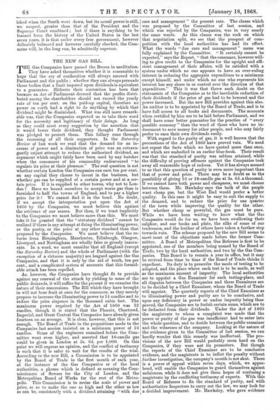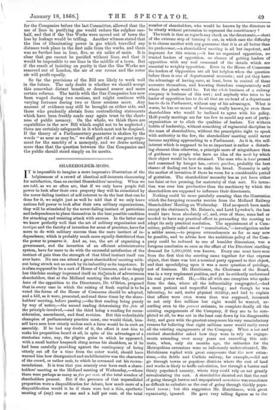THE NEW GAS BILL.
THE Gas Companies have passed the Recess in meditation. They have asked themselves whether it is reasonable to hope that the cry of confiscation will always succeed with Parliament and the public ; whether they can always persuade those bodies that a limit imposed upon dividends is equivalent to a guarantee. Hitherto their contention has been that because an Act of Parliament decreed that the profits distri- buted among the shareholders should not exceed the yearly rate of ten per cent. on the paid-up capital, therefore no power on earth had a right to do anything by which that dividend might be diminished. What was still more remark- able was, that the Companies expected us to take their word for the necessity and legitimacy of their doings. As long as they could meet every suggestion by the assertion that it would lower their dividend, they thought Parliament was pledged to protect them. This fallacy runs through the reasoning of all their supporters. In the Saturday Review of last week we read that the demand for an in- crease of power and a diminution of price was an extrava- gantly unjust attempt to reduce the authorized dividend, an argument which might fairly have been used by any butcher when the consumers of his commodity endeavoured " to regulate its price at their pleasure." The real question is not whether certain London Gas Companies can earn ten per cent. on any capital they choose to invest in the business, but whether gas can be supplied of a certain power and at a cer- tain price. If it is supplied to other towns, why not to Lon- don ? Have we bound ourselves to accept worse gas than is furnished to half the towns of England, and to pay a higher price for it ? We cannot find it in the bond. No doubt, if we accept the interpretation put upon the Act of 1860 by the Companies, we must believe this against the evidence of our senses. But then, if we trust implicitly to the Companies we must believe more than this. We must take it for granted that the " statutory dividend " cannot be realized if there is any attempt at fixing the illuminating power, or the purity, or the price at any other standard than that proposed by the Companies. We must believe that the re- turns from Birmingham, Manchester, Edinburgh, Glasgow, Liverpool, and Nottingham are wholly false or grossly inaccu- rate. In a word, we must consider that all England (except the Saturday Review) and the whole of Parliament (with the exception of a virtuous majority) are leagued against the Gas Companies, and that it is only by the aid of truth, ten per cent., and a complicated system of accounts that this formid- able attack has been repelled.
As, however, the Companies have thought fit to provide against any renewal of the attack by yielding to some of the public demands, it will suffice for the present if we examine the nature of their concessions. The Bill which they have brought in will not bear fruit at once for the consumer, as they merely propose to increase the illuminating power to 14 candles and to reduce the price sixpence in the thousand cubic feet. The maximum power required by the Act of 1860 was 12 candles, though it is stated that the Phoenix, Chartered, Imperial, and Great Central Gas Companies have already given fourteen on an average. It is clear, however, that this is not enough. The Board of Trade in the propositions made to the Companies last session insisted on a minimum power of 16 candles. Some of the engineers examined before the Com- mittee went even higher, and asserted that 18-candle gas could be given in London at 3s. 6d. per 1,000. On this point we will express no opinion, and the conflict of testimony is such that it is safer to wait for the results of the trial. According to the new Bill, a Commission is to be appointed by the Board of Trade in the first month of each year, at the instance of the Gas Companies or of the local authorities, a phrase which is defined as meaning the Com- missioners of Sewers for the City of London, and the Metropolitan Board of Works for the rest of the Metro- polis. This Commission is to revise the scale of power and price, so as to make the one as high and the other as low as can be, consistently with a dividend attaining " with due care and management " the present rate. The clause which was proposed by the Committee of last session, and which was rejected by the Companies, was in very nearly the same words. As this clause was the rock on which that negotiation split, we see that the prospect of com- petition with the local authorities has had its effect. What the words "due care and management" mean was fully explained by the Committee. " It certainly cannot be expected," says the Report, " that the consumer, however will- ing to give credit to the Companies for the upright and effi- cient management of their affairs, will be satisfied with a system under which no one appears to have an over-ruling interest in reducing the aggregate expenditure to a minimum except himself, and under which no one who represents his interest has any share in or control over the direction of that expenditure." This it was that threw such doubt on the statements of the Companies as to the inevitable reduction of their dividends if the price of gas had to be lowered and the power increased. But the new Bill provides against this also. An auditor is to be appointed by the Board of Trade, and is to have full access to all books and documents. The accounts when certified by him are to be laid before Parliament, and we shall have some better guarantee for the practice of " every possible economy " than the word of those who have no in- ducement to save money for other people, and who may fairly prefer to earn their own dividends easily.
With regard to the purity of gas, it is well known that the precautions of the Act of 1860 have proved vain. We need not repeat the facts which we have quoted more than once, and which are embodied in an earlier blue-book. Their result was that the standard of purity was seldom attained, while the difficulty of proving offences against the Companies took away all reasonable hope of redress. Yet it has always seemed to us that this question of purity is even more important than that of power and price. There may be a doubt as to the possibility of giving 16 or 18-candle gas at 3s. 6d. a thousand. If we cannot have both power and cheapness, we must choose between them. Mr. Hawksley says the bulk of the people want cheap gas, but the West End would prefer a better quality. In this case it might be easy to suit the supply to the demand, and to reduce the price for one quarter of the town while improving the quality for the other. But whether cheap or powerful, the gas must be pure. While we have been waiting to know what the Gas Companies would do for us, we have been swallowing their sulphur, and our books and plate, the silks of some of our tradesmen, and the leather of others have taken a further step towards ruin. The scheme proposed by the new Bill seems to meet most of the objections made before the former Com- mittee. A Board of Metropolitan Gas Referees is first to be appointed, one of the members being named by the Board of Trade, two by the local authorities, and two by the Gas Com- panies. This Board is to remain a year in office, but it may be revived from time to time if the Board of Trade thinks it expedient. Its duty is to prescribe the mode of testing to be adopted, and the place where each test is to be made, as well as the maximum amount of impurity. The local authorities are to appoint a Gas Examiner for each testing-place, and all disputes between the Companies and these Examiners are to be decided by a Chief Examiner, whom the Board of Trade will appoint. The quarterly reports of the Chief Examiner as to illuminating power and purity are to be conclusive, and upon any deficiency in power or undue impurity being thus proved, the Companies are to forfeit certain sums, which are to be deducted from their dividends. Under the Act of 1860 the magistrate to whom a complaint was made that the power or purity of the gas was insufficient had to enter into the whole question, and to decide between the public examiner and the witnesses of the company. Looking at the nature of the evidence given to the Committee of last session, we can hardly wonder that this remedy was ineffectual. The pro- visions of the new Bill would probably seem hard on the Companies, if they were not its promoters. But though the reports of the Chief Examiner are to be conclusive evidence, and the magistrate is to inflict the penalty without further investigation, the company's mouth is not shut. There is a power of appeal within seven days, which, we appre- hend, will enable the Companies to guard themselves against unfairness, while it does not give them hopes of confusing a magistrate by the conflicting testimony of experts. With this Board of Referees to fix the standard of purity, and with authoritative Inspectors to carry out the law, we may look for a decided improvement. Mr. Hawksley, who gave evidence
for the Companies before the last Committee, allowed that the use of lime in purifying gas would reduce the sulphur one- half, and that if the Gas Works were moved out of town the loss by leakage would be trifling. Another witness stated that the loss of illuminating power in gas which travelled any distance took place in the first mile from the works, and there was no further loss in four, five, or six miles of main. It is clear that gas cannot be purified without lime, and that it would be impossible to use lime in the middle of a town. But if the result of insisting on purity is that the Gas Works are removed out of London, the air of our rooms and the outer air will profit equally.
So far the provisions of the Bill are likely to work well in the future. The only doubt is whether we should accept this somewhat distant benefit, or demand nearer and more certain reforms. The battle with the Gas Companies has now been waged during two sessions, and might continue with varying fortunes during two or three sessions more. Any amount of evidence may still be brought on either side, and those who prudently abstain from contradicting statements which have been freshly made may again trust to the short- ness of public memory. On the whole, we think there are capabilities in the new Bill which ought not to be neglected ; there are certainly safeguards in it which must not be despised. If the theory of a Parliamentary guarantee is shaken by the words " as near as may be," we shall get rid of one great argu- ment for the sanctity of a monopoly, and we desire nothing more than that the question between the Gas Companies and the public should stand simply on its merits.































 Previous page
Previous page